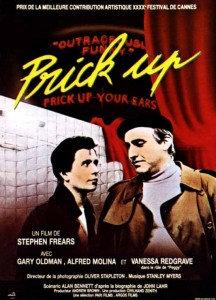Prick Up Your Ears (1987)
“My plays are about getting away with it, and the ones who get away with it are the guilty ones. It’s the innocents who get it in the neck.”
|
Synopsis: |
|
Genres, Themes, Actors, and Directors:
Review: Because the film opens with Orton’s bloody death, there’s no surprise about the outcome of events; instead the shifting power dynamics in Orton and Halliwell’s evolving relationship is the focus of the screenplay. We’re shown Halliwell’s pathological inability to deal with Orton’s sudden success, and Orton’s refusal to leave Halliwell behind despite his desire to be with other men. (In many ways, Prick Up Your Ears is a post-modern variation on A Star is Born.) The acting throughout is commendable: Oldman is note-perfect as Orton, showcasing his cockiness and pan-sexuality, and Molina is mostly effective (and appropriately creepy) as Halliwell, though he gradually loses our sympathy. Also notable is the incomparable Vanessa Redgrave, in a small yet pivotal role as the third party left behind to tell the world about Orton and Halliwell’s tragic love story. Redeeming Qualities and Moments:
Must See? Categories
Links: |

One thought on “Prick Up Your Ears (1987)”
A must, but not only for Oldman’s pitch-perfect performance (as well as Redgrave’s – brilliant again; and Molina’s – brave, very brave). It’s a powerful, if excruciating, film with a terrifically detailed screenplay (which only gets tighter, sharper as it goes along). I think less of ‘A Star is Born’, tho, than ‘Who’s Afraid of Virginia Woolf?’: two people who seem to live to tear each other apart. That’s a phenomenon in relationships in general that – highlighted here – keeps ‘Prick’ from being first and foremost a film about gay people.
The specifics of Orton and Halliwell’s relationship were no doubt more twisted than the film could ever illuminate. Still, it’s clear that Halliwell by all accounts wanted a lifelong personal and public collaboration. Orton was far too vain and opportunistic for that. Which is so weird when it comes time to appreciate his plays – which are, indeed, deliriously, scathingly funny. (Seeing the original production of ‘What the Butler Saw’ in NYC was one of the most riotous theater evenings I spent.) It’s the age-old dilemma of the artist being incomparable, but the person is most likely an asshole. Tough call on what to think.
There are any number of fascinating touches in this subtly directed film:
Note Orton’s remark to Ramsay: “Cheap clothes suit me. It’s because I’m from the gutter.” He tries to pass that line off as his own, when it’s Halliwell who first says it to Orton.
Lahr’s working relationship with his wife is shown briefly as a kind of mirror image of Orton’s and Halliwell’s.
The orchestration of the toilet scene after ‘Loot’ wins best play. A very accurate portrait of gay life run amok pre-AIDS.
There’s some delineation of Orton/Halliwell’s time writing novels together. Reading the novels is something else: they read like the work of two people; not seamless, but like one ego trying to overpower another.
At the end, a bit of The Beatles song ‘A Day In The Life’ – called Orton’s favorite song – is heard.
The film of Orton’s life is ultimately better than film adaptations of his work. ‘Entertaining Mr. Sloane’ was rather successful, all things considered. However, ‘Loot’ – though interesting to watch – works much better on the stage.
Fave scene: Orton auditioning for RADA, playing two characters in ‘Peter Pan’.